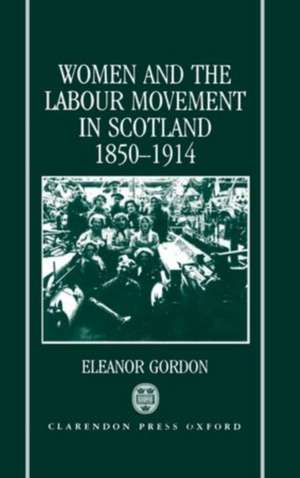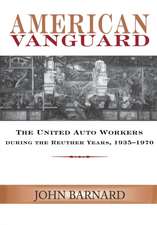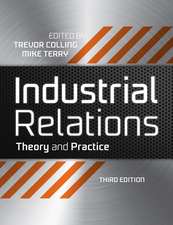Women and the Labour Movement in Scotland 1850-1914
Autor Eleanor Gordonen Limba Engleză Hardback – 14 aug 1991
Preț: 318.77 lei
Preț vechi: 409.01 lei
-22% Nou
Puncte Express: 478
Preț estimativ în valută:
61.00€ • 66.24$ • 51.24£
61.00€ • 66.24$ • 51.24£
Carte tipărită la comandă
Livrare economică 11-17 aprilie
Preluare comenzi: 021 569.72.76
Specificații
ISBN-13: 9780198201434
ISBN-10: 0198201435
Pagini: 328
Ilustrații: tables
Dimensiuni: 144 x 221 x 24 mm
Greutate: 0.53 kg
Editura: Clarendon Press
Colecția Clarendon Press
Locul publicării:Oxford, United Kingdom
ISBN-10: 0198201435
Pagini: 328
Ilustrații: tables
Dimensiuni: 144 x 221 x 24 mm
Greutate: 0.53 kg
Editura: Clarendon Press
Colecția Clarendon Press
Locul publicării:Oxford, United Kingdom
Cuprins
Abbreviations; Introduction; Women's employment in Scotland 1850-1914; The Trade Union Movement in Scotland; Women, Trade Unionism, and Industrial Militancy 1850-1890; The mill, the factory and the community in Dundee's jute industry 1860-1914; Disputes in Dundee's jute industry; Women and Trade Unionism 1890-1914; Women and working-class politics 1900-1914; Conclusion; Bibliography; Index
Recenzii
Eleanor Gordon's book is a significant work ... Gordon's overview of the trade union movement is in fact a preamble to a fascinating assessment of militancy among women workers. ... thoroughly researched, soundly argued, and full of theoretically informed insights ... this is a valuable contribution to our understanding of the history of women and labor protest. Indeed, it will take its place as one of the groundbreaking new studies that demonstrate the imperative for feminist theory to be intergrated into labor history.
an important contribution to current historiographical debates over the sexual division of labour, working class consciousness and domestic ideologies and to the history of women in Scotland
... pioneering and well researched book ... This is an excellent and subtle exploration of a world almost untouched by conventional labour history. Eleanor Gordon's research has been wide and deep. ...This a thought-provoking and important book. It will surely be the first of many forays in the field by the author.
Gordon's study challenges the stereotype of the subordinate, passive, backward woman worker
well-written book
Labor history and the history of women, each a fruitful area of academic enquiry in its own right, have seldom been so well integrated as in this study of working women in Scotland ... well written. The conclusions are soundly based on examination of a variety of sources and on arguments that are both logical and sensible.
This is a useful and thought-provoking book ... her argument is important and convincing.
With this study another gap in the history of Scottish labor has been bridged ... a valuable contribution to labor history.
important work ... In her analysis of women workers' involvement in and relationship to trade unionism Gordon makes a significant contribution to current debates ... the work succeeds as a coherent entity, rich in detail and strong on explanatory power. Its analysis of the formation of labour relations and of the nature and meanings of women's industrial struggles invites international comparisons.
One of the startling results of Eleanor Gordon's research is that, far from being passive in the work place, women in Scotland, especially in the textile industries, were vigorous in their pursuit of wage and other claims.
an important contribution to current historiographical debates over the sexual division of labour, working class consciousness and domestic ideologies and to the history of women in Scotland
... pioneering and well researched book ... This is an excellent and subtle exploration of a world almost untouched by conventional labour history. Eleanor Gordon's research has been wide and deep. ...This a thought-provoking and important book. It will surely be the first of many forays in the field by the author.
Gordon's study challenges the stereotype of the subordinate, passive, backward woman worker
well-written book
Labor history and the history of women, each a fruitful area of academic enquiry in its own right, have seldom been so well integrated as in this study of working women in Scotland ... well written. The conclusions are soundly based on examination of a variety of sources and on arguments that are both logical and sensible.
This is a useful and thought-provoking book ... her argument is important and convincing.
With this study another gap in the history of Scottish labor has been bridged ... a valuable contribution to labor history.
important work ... In her analysis of women workers' involvement in and relationship to trade unionism Gordon makes a significant contribution to current debates ... the work succeeds as a coherent entity, rich in detail and strong on explanatory power. Its analysis of the formation of labour relations and of the nature and meanings of women's industrial struggles invites international comparisons.
One of the startling results of Eleanor Gordon's research is that, far from being passive in the work place, women in Scotland, especially in the textile industries, were vigorous in their pursuit of wage and other claims.
















